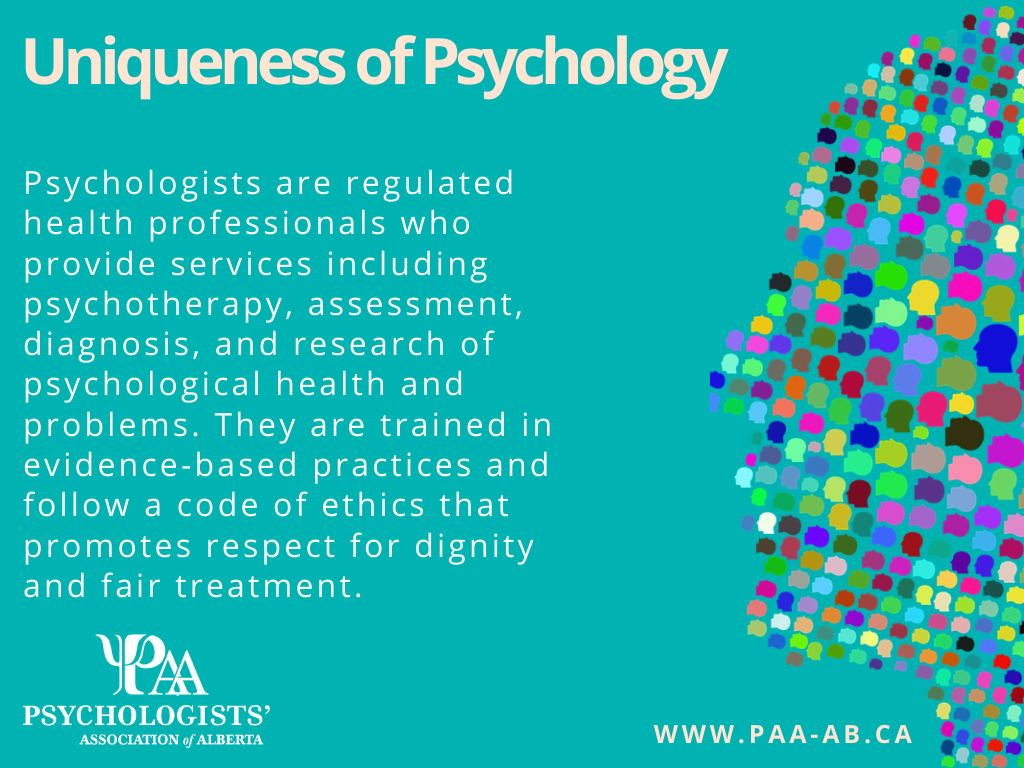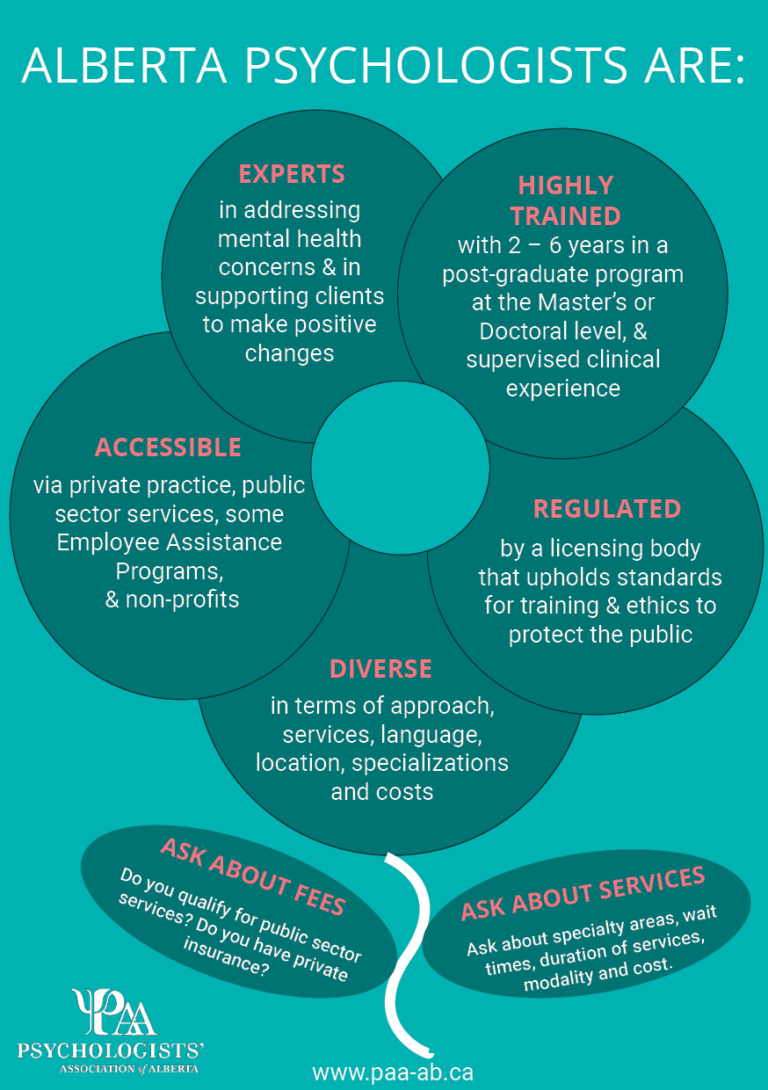About Psychology
Psychologists are regulated health professionals who provide services including psychotherapy, assessment, diagnosis, and research of psychological health and problems. They are trained in evidence-based practices and follow a code of ethics that promotes respect for dignity and fair treatment.
Alberta’s psychologists have advanced university degrees (Masters or Doctoral) and undergo extensive supervised training and examinations. Psychologists study the biological, cognitive, emotional, social, cultural, and environmental determinants of behaviour. Through such extensive research and practice, psychologists help people cope more effectively in daily life.
PAA – Qualified Professionals
Full and Life members of the PAA are registered psychologists. They adhere to a strict code of professional ethics and are registered with, and regulated by, the College of Alberta Psychologists. They know how to help people deal with their feelings and attitudes and develop healthier and more effective patterns of behaviour. Psychology is an extraordinarily diverse field with hundreds of career paths. Some specialties, like assessment and treatment, are familiar to most of us. Others, like helping with the design of advanced computer systems or studying how we remember things, are less well known. What all psychologists have in common is a shared interest in human behaviour. In their work, they draw on an ever-expanding body of scientific knowledge about how we think, act, and feel, and apply the information to their special areas of expertise. Among psychologists, researchers spend most of their time generating knowledge, and practitioners apply the knowledge; some psychologists do both.

Psychology – a Hub Science
A comprehensive 1-hour overview by Steven Pinker, a noted Canadian-American cognitive psychologist and linguist, as part of his Harvard psych course.
You can also access the overview by clicking HERE
What Do Psychologists Do?
Practicing Psychologists are qualified professionals who provide assessment, consultation and treatment for people of all ages. For more information, see “The Value of Choosing a Psychologist” brochure.

Areas of specialization include:
- Personal growth
- Career planning and life transitions
- Learning and attention difficulties
- Marital and relationship issues
- Parenting and family concerns
- Separation and divorce
- Depression
- Stress
- Anxiety
- Pain management
- Health and wellness
- Traumatic experiences
- Habit disorders
- Substance abuse
- Problem gambling
- Workplace stress
- Performance enhancement
About Psychologists
The education and training background of psychologists includes:
- At least six years of university education, including a minimum of a Master’s degree.
- One year (1600 hours) of practice supervised by an experienced psychologist.
- Successful completion of the Examination for Professional Practice in Psychology, a comprehensive, standardized exam used for psychologists in North America.
- The completion of an oral examination conducted by a panel of three senior psychologists.
In addition to the above credentials, many psychologists have also obtained a Ph.D. It is appropriate to refer to such individuals with the honorific ‘doctor’. For example, a print interview may list Psychologist C. Rogers for a non-Ph.D. psychologist and list Psychologist Dr. C. Rogers for an individual with a Ph.D.
The Psychologists Association of Alberta values the opportunity to assist the media in providing quality mental health/psychological information to the public.
About Therapy
At times we need outside help from a trained, registered professional in order to work through these problems. Through therapy, psychologists help people of all ages live healthier, more productive lives. Consider Therapy If…
- You feel an overwhelming and prolonged sense of helplessness and sadness, and your problems do not seem to get better despite your efforts and help from family and friends.
- You are finding it difficult to carry out everyday activities. For example, you are unable to concentrate on assignments at work, and your job performance is suffering as a result.
- You worry excessively, expect the worst, or are constantly on edge.
- Your actions are harmful to yourself or others. For instance, you are drinking too much alcohol, abusing drugs, or becoming overly argumentative and aggressive.
What is Psychotherapy?
- Psychologists apply scientifically validated procedures to help people change their thoughts, emotions, and behaviours.
- Psychotherapy is a collaborative effort between an individual and a psychologist.
- Psychotherapy provides a supportive environment to talk openly and confidently about concerns and feelings.
- Psychologists consider maintaining your confidentiality extremely important and will answer your questions regarding those circumstances when confidential information must be shared.
What to Consider When Making the Choice… Psychologists and clients work together. The right match is important. Most psychologists agree that an important factor in determining whether or not to work with a particular psychologist, once that psychologist’s credentials and competence are established, is your level of personal comfort with that psychologist. A good rapport with your psychologist is critical. Choose a psychologist with whom you feel comfortable and at ease.
Questions To Ask…
- Are you a registered psychologist?
- How many years have you been practicing psychology?
- I have been feeling (anxious, tense, depressed, etc.), and I’m having problems (with my job, my marriage, eating, sleeping, etc.); what experience do you have helping people with these types of problems?
- What are your areas of expertise — for example, working with children and families?
- What kinds of treatments do you use, and have they been proven effective for dealing with my kind of problem or issue?
- What are your fees?
Credentials to Look For:
To become a Registered Psychologist in Alberta, a Master’s degree is required. One year (1600 hours) of supervised practice is also required under an experienced supervisor, and comprehensive written and oral examinations must also be successfully completed. It is this combination of training and supervised practice that distinguishes psychologists from many other mental health care providers. Psychologists must be registered by the College of Alberta Psychologists. Registration laws are intended to protect the public by limiting registration to those persons qualified to practice psychology as defined by provincial law. In addition, members of the College of Alberta Psychologists adhere to a strict code of professional ethics. In Alberta, only Registered Psychologists are allowed by law to refer to themselves as Psychologists.
Will Psychotherapy Help Me?
According to a research summary from the Stanford University School of Medicine, some forms of psychotherapy can effectively decrease patients’ depression, anxiety, and related symptoms — such as pain, fatigue, and nausea. Research increasingly supports the idea that emotional and physical health are closely linked and that psychotherapy can improve a person’s overall health. There is convincing evidence that most people who have at least several sessions of psychotherapy are far better off than individuals with emotional difficulties who are untreated. One major study showed that 50 percent of patients noticeably improved after eight sessions, while 75 percent of individuals in therapy improved by the end of 6 months.
How Will I Know If the Therapy Is Working?
As you begin therapy, you should establish clear goals with your psychologist. You might be trying to overcome feelings of hopelessness associated with depression or control a fear that is disrupting your daily life. Remember, certain goals require more time to reach than others. You and your psychologist should decide at what point you may expect to begin to see progress. People often feel a wide variety of emotions during psychotherapy. Some qualms about therapy that people may have result from difficulty discussing painful and troubling experiences. When you begin to feel relief or hope, it can actually be a positive sign indicating that you are starting to explore your thoughts and behaviour.
Checkup from the neck up
Your mental health is just as important as your physical health. This simple, online, private, mental health check-up from the Mood Disorders Association of Ontario can identify some symptoms of common mood disorders so you can get help if you need it. You can also learn more about mood disorders on this site and find resources to help yourself, your family members, or friends. More…
